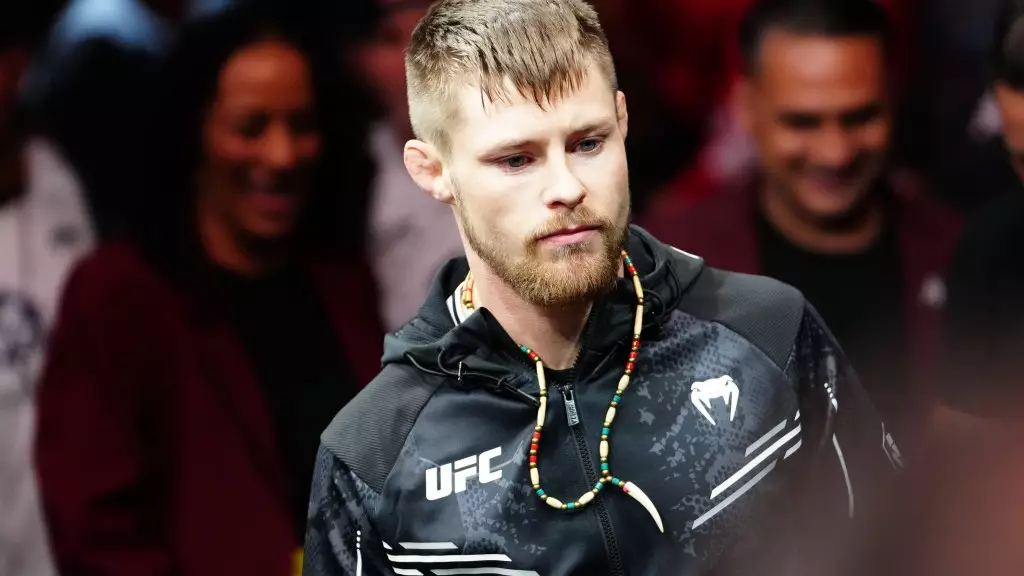In an age where public figures can influence millions with a single statement, UFC fighter Bryce Mitchell’s recent podcast comments have sparked a significant backlash. His remarks about Adolf Hitler, wherein he controversially described the dictator as “a good guy,” have led to extensive criticism, both from fans and other athletes, including UFC CEO Dana White. This incident serves as a reminder of the weight that celebrity opinions carry in today’s hyper-connected society, and it raises critical questions about accountability and the consequences of speech.
The Statements that Sparked Outrage
Mitchell made headlines when he expressed his views during the “ArkanSanity Podcast,” where he defended Hitler by citing personal research that veered dangerously close to historical revisionism. Despite his subsequent apology, wherein he insisted he did not support Hitler and acknowledged the atrocities of the Holocaust, the damage was done. His initial statements were filled with problematic perspectives that seemed disconnected from widely accepted historical facts.
Critics quickly addressed the discrepancy between his podcast statements and his later clarifications. This inconsistency underscores a critical issue: to what extent should public figures be held accountable for their words, especially when those words perpetuate harmful narratives? The public’s swift response highlights a growing intolerance for flippant or dismissive attitudes towards serious historical events, particularly in light of rising movements aimed at combating anti-Semitism and promoting inclusivity.
The Apology and Its Implications
In his apology issued via Instagram, Mitchell acknowledged the insensitivity of his comments, stating, “I’m sorry I sounded insensitive.” However, the effectiveness of this apology is questionable; it lacks a comprehensive understanding of the profound impact that his remarks may have on communities affected by Hitler’s regime. While he tried to distance himself from Nazi ideology, the praise he initially expressed for Hitler undoubtedly casts a long shadow over his apology.
The phrase “I definitely was not trying to offend anybody” is often seen in apologies from public figures, yet it raises an immediate concern: do they genuinely understand the implications of their statements? True accountability requires acknowledgment of the potential harm caused and an effort to rectify misconceptions. Unfortunately, many figures offering “sorry” miss the mark on what genuine contrition looks like.
UFC CEO Dana White did not mince words when responding to Mitchell’s comments, calling them abhorrent and labeling the fighter as one of the “dumbest human beings.” This kind of response is critical not only for the integrity of the sport but also for setting a cultural standard within the UFC community. It signals that certain sentiments—specifically those that glorify hate or promote intolerance—are unacceptable, fostering a climate of accountability.
Moreover, former UFC fighter Rolando Delgado, who co-hosted the podcast, faced backlash for not countering Mitchell’s remarks during the conversation. His acknowledgment of the consequences of their dialogue illustrates the broader context of collective responsibility within platforms that allow for controversial discussions. As Delgado mentioned, “Freedom of speech doesn’t mean freedom from the consequences of that speech,” a sentiment that resonates deeply in discussions surrounding cancel culture and the ongoing battle against harmful rhetoric.
This incident serves as a critical moment for public discourse, particularly in how sensitive topics are discussed. Celebrities and influencers hold significant power; thus, it’s essential that they grasp the full ramifications of their words. As society grapples with the rise of digital media and its capacity to amplify voices, it becomes crucial to foster an environment where informed and respectful discourse prevails.
The aftermath of Bryce Mitchell’s comments may act as a cautionary tale, urging other public figures to approach discussions about history, especially topics involving atrocities, with care and clarity. It highlights the need for more comprehensive education not just among athletes, but throughout society. Recognizing the past and its effects on current generations is vital to ensuring that discussions promoting hate and division become less normalized.
The episode involving Bryce Mitchell challenges us all to reflect on the weight of our words and the historical contexts behind our statements. Public figures must understand that their influence touches far more lives than they may realize. A genuine effort to educate oneself and engage in respectful discussion can pave the way for a more thoughtful and informed society, creating a space where history is honored and the lessons of the past are upheld.

